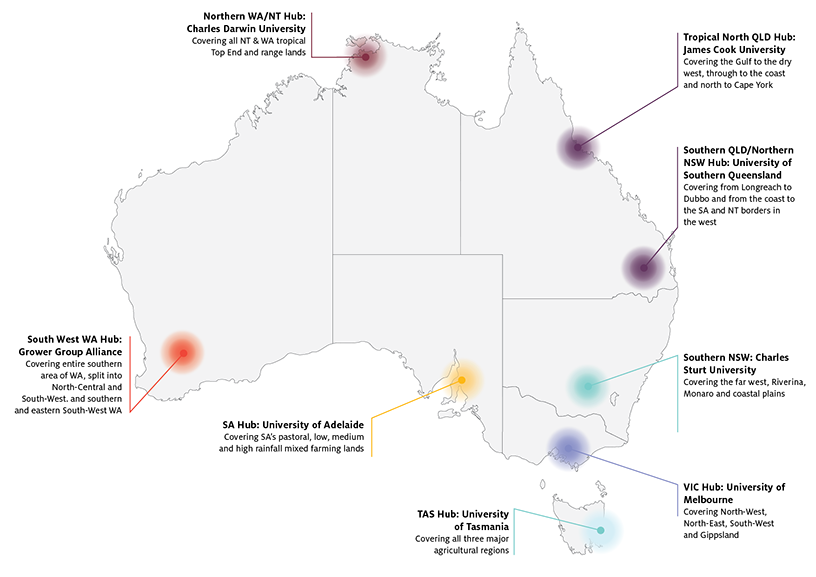In April 2021, 8 Hubs were launched across the country following a competitive grant process.
Regional universities lead 7 of the Hubs and a grower group alliance leads the eighth.
Hubs are made up of various stakeholders. They include industry, researchers, farmers, and community groups.
Hubs support farmers and communities to prepare for drought by connecting farmers to regional experts, innovations, and new practices.
Every Hub has a Knowledge Broker who helps translate science into practice for their region. Using their networks, they boost collaboration and learning across Hubs. They also make connections with other Future Drought Fund (FDF) programs.
In March 2022, an extra $9 million was announced for Adoption Officers. Adoption Officers will work with farmers and their communities to pick up the innovative tools and practices to build drought-resilient businesses.
In April 2022, $4 million was announced for Hub Projects. This funding will support the Drought Resilience Adoption and Innovation Hubs to work together on drought resilience projects. The result will be drought resilience gains that farmers and rural communities can see in 12 months.
Under the first Funding Plan (2020 to 2024) a total of $89 million in funding from the FDF was committed to the Hubs.
Under the new Funding Plan (2024 to 2028), $28 million over 2 years from 2024-25 was announced in the 2024-25 Budget to continue on ground activity. A review will inform any longer-term funding opportunity, with $104 million available over years 6 from 2026-27.
The FDF Drought Hubs Review
In September 2023, the Productivity Commission released their Inquiry Report on the FDF, which recommended a mid-term performance review of the Hubs be undertaken.
The review evaluated the performance of the Hubs since their establishment, as well as the governance and operation of the hubs program. The review assessed the appropriateness of the program into the future.
The panel appointed to conduct the Hubs review was chaired by Daryl Quinlivan and assisted by Charlie Tulloch, Evaluation Expert, with the support of a review team from the department.
Stakeholders were encouraged to share their views via the Have Your Say platform by providing a written response.
Submissions closed on 2 October 2024. 23 public submissions have been published online.
The review was finalised in March 2025 and provided to government for consideration.
The report notes 51 findings and 28 recommendations to improve the hub model to support drought preparedness and resilience.
The Government will review these recommendations to inform the design and launch of a new open competitive grant round for the Drought Hub program by the end of March 2026.
To ensure there is no gap in service to farmers while we transition to future hubs arrangements, the arrangements with existing hubs providers will be extended for up to 12 months from 1 July 2026.
The Drought Resilience Adoption and Innovation Hubs Review
If you have difficulty accessing these files please email fdfhubs@aff.gov.au for assistance.
Activities
Hub activities have been designed in collaboration with farmers and other stakeholders to meet local needs. Examples include:
- on-farm trials of transformational technologies and practices
- training farmers to use decision-support tools
- upskilling farmers in innovation, entrepreneurship and commercialisation.
Hub locations
Australia has 8 Hubs in key climatic and agriculture zones. Each Hub has several nodes that reaches across their region. Together, they cover over 40 locations and involves more than 140 partners.
See more about each hub
Drought Resilience Research and Adoption and Innovation Hubs Advisory Committee
In May 2021, the Minister for Agriculture established an independent advisory committee to provide a national perspective on the operation of the Drought Resilience Research and Adoption Program. The committee reported to the Minister and the Department up until 30 June 2025.
The Minister formerly appointed Brent Finlay (Chair), Emeritus Professor James Rowe, Trent De Paoli, Professor Bronwyn Harch, Carolyn Welsh, Dale Park, and Dr. Christine Pitt as its initial members until 30 June 2024.
In June 2024, the Minister subsequently appointed committee members to serve for a 12-month period until 30 June 2025. This included continuing members: Brent Finlay (Chair), Carolyn Welsh, Dale Park and Dr Christine Pitt and new members Margo Andrae, Rene Woods and Julia Spicer.
Funding information
Find details of the payment information for the Drought Resilience Research, Adoption and Innovation Hubs program as required under Section 27A of the Future Drought Fund Act 2019 below.
Download
- Future Drought Fund: Drought Resilience Research, Adoption and Innovation Hubs (PDF 310 KB)
- Future Drought Fund: Drought Resilience Research, Adoption and Innovation Hubs (DOCX 164 KB)
- Future Drought Fund: Drought Resilience Adoption and Innovation Hubs Review (PDF 209 KB)
- Future Drought Fund: Drought Resilience Adoption and Innovation Hubs Review (DOCX 167 KB)
- Future Drought Fund: Adoption Officers (PDF 224 KB)
- Future Drought Fund: Adoption Officers (DOCX 182 KB)
- Future Drought Fund: Funding information - Hub Projects (PDF 229 KB)
- Future Drought Fund: Funding information - Hub Projects (DOCX 677 KB)
If you have difficulty accessing these files, contact us for help.

